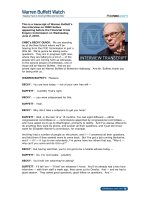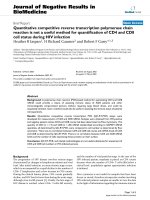ESSENTIAL INTERNATIONAL TRADE LAW
Bạn đang xem bản rút gọn của tài liệu. Xem và tải ngay bản đầy đủ của tài liệu tại đây (2.74 MB, 184 trang )
ESSENTIAL
INTERNATIONAL
TRADE LAW
CP
Cavendish
Publishing
(Australia)
Pty Limited
Sydney • London
Titles in the series:
Essential Administrative Law
Essential Australian Law
Essential Company Law
Essential Constitutional Law
Essential Contract Law
Essential Criminal Law
Essential Equity and Trusts
Essential Evidence
Essential Family Law
Essential International Trade Law
Essential Management Law
Essential Professional Conduct: Legal Accounting
Essential Professional Conduct: Legal Ethics
Essential Tort Law
ESSENTIAL
INTERNATIONAL
TRADE LAW
Michelle Sanson, B Bus, LLB (Hons),
Lawyer, Trade & Transport,
Blake Dawson Waldron, Sydney
General Editor
Professor David Barker
Dean of the Faculty of Law,
University of Technology, Sydney
CP
Cavendish
Publishing
(Australia)
Pty Limited
Sydney • London
First published 2002 by Cavendish Publishing (Australia) Pty Limited,
3/303 Barrenjoey Road, Newport, New South Wales 2106
Telephone: (02) 9999 2777
Facsimile: (02) 9999 3688
Email:
Cavendish Publishing Limited, The Glass House, Wharton Street,
London WC1X 9PX, United Kingdom
Telephone: +44 (0)20 7278 8000 Facsimile: +44 (0)20 7278 8080
Email:
Website: www.cavendishpublishing.com
© Sanson, M 2002
All rights reserved. Except as permitted under the Copyright Act 1968
(Cth), no part of this publication may be reproduced or transmitted in
any form or by any means, electronic or mechanical, photocopying,
recording or otherwise, without the prior permission of the publisher
and copyright owner.
Any person who infringes the above in relation to this publication
may be liable to criminal prosecution and civil claims for damages.
National Library of Australia Cataloguing in Publication Data
Sanson, Michelle
International trade law
1 Foreign trade regulation – 2 Foreign trade regulation – Australia
I Title (Series: Australian essential series)
341.754
ISBN 1 876905 10 7
Printed and bound in Great Britain
Foreword
For some time now Australian governments at all levels have made
the promotion of export their trade priority. From the Department of
Foreign Affairs & Trade in Canberra to the smallest regional council,
all now recognise that promoting export is essential to job and wealth
creation and to increasing Australia’s international competitiveness.
And the message from the business community in response to
these government initiatives is clear too; training is essential. While
business is quick to accept the attractions and potential rewards of
international trade, most need to ‘re-tool’ before they are prepared to
make their first forays into international markets.
International trade requires new procedures and embraces new
risks. Without familiarity of the basic ingredients of an international
trade transaction, many businesses lack the confidence to take the first
step.
Essential International Trade Law will be required reading both for
businesses starting out in international trade, and for legal
practitioners looking for some grounding in what is one of the most
satisfying and intellectually rewarding areas of legal practice.
Geoff Farnsworth
President
Australian Institute of Export Ltd
v
Preface
This book is part of the Cavendish Essential Series. The books in the
series constitute a unique publishing venture for Australia in that they
are intended as a helpful revision aid for the hard-pressed student.
They are not intended to be a substitute for the more detailed
textbooks which are already listed in the current Cavendish catalogue.
Each book follows a prescribed format consisting of a checklist
covering each of the areas in the chapter, and an expanded treatment
of ‘Essential’ issues looking at examination topics in depth.
The authors are all Australian law academics who bring to their
subjects a wealth of experience in academic and legal practice.
Professor David Barker
General Editor
Dean of the Faculty of Law,
University of Technology, Sydney
vii
Acknowledgments
Thanks and appreciation to Professor David Barker, who put me
forward for the task of writing this book, and who continues to be an
enormous inspiration to all law students, past and present, at the
University of Technology, Sydney; Dr Iur Katrin Cutbush-Sabine, who
lectured me in this subject and who has been involved in the genesis
of this book; Blake Dawson Waldron for their support; and to all those
who love and support me generally in my life.
ix
Contents
Foreword by Geoff Farnsworth...........................................…........................v
Preface.....................……………………………………………………......vii
Acknowledgments..……………………………………………………........ix
Table of Cases...............................................................................................xiii
1 Introduction to International Trade Law............................................1
2 Frameworks for Understanding..………………………………….....3
3 World Trade Organisation …………………………………………..11
4 Trading Blocs……………………………………………………..........25
5 Competition…………………………………………………................37
6 International Trade Contracts……………………………………….59
7 Dispute Settlement...........................……………..…………………123
8 Electronic Commerce………..……………………………………....143
Index……………………………………………………………………....153
xi
Table of Cases
American Diagnostics Inc v Gradipore Ltd (1998) 44 NSWLR 312
Arab African Energy Corporation Ltd v
Oliprodukten Nederland BV [1983] 2 LLR 419
Arnotts v Trade Practices Commission (1990) ATPR 41-061
Arnhold Karberg v Blythe, Green, Jourdain & Co [1915] 2 KB 379
Associated Alloys Pty Ltd v ACN 001 452 106 Pty Ltd
(In Liquidation) [2000] HCA 25
ASX Operations v Pont Data Australia (1991) ATPR; 97 ALR 513
Attorney-General v Adelaide Steamship Co (1913) 18 CLR 30
Australian Capital Territory v Munday [2000] FCA 653
Australian Competition & Consumer Commission v
Roche Vitamins Australia Pty Ltd [2001] FCA 150
Australian Competition and Consumer Commission v
Tyco Australia Pty Ltd [2001] FCA 176
138
Bright v Femcare Ltd [2000] FCA 742
147
Castlemaine Tooheys v Williams and Hodgkins Transport
(1986) 162 CLR 395
Clark King & Co Pty Ltd v Australian Wheat Board
(1978) 140 CLR 120
Cool & Sons v O’Brien Glass Industries (1981) unreported, 13 July,
Fed Ct, Keely J
138
44
79
103
41
50
51
40
42
47
8
38
Dandy Power Equipment v Mercury Marine (1982) 44 ALR 173
Davids Holdings v Attorney-General (1994) ATPR 41-304;
49 FCR 211
Dowling v Dalgety Australia (1992) 14 ATPR 31-165;
106 ALR 75; 34 FCR 109
38, 47
44, 46
Eastern Express v General Newspapers (1991) 13 ATPR 41-128;
103 ALR 41; 30 FCR 385
45, 46
38
xiii
ESSENTIAL INTERNATIONAL TRADE LAW
Gallagher v Pioneer Concrete (1993) 14 ATPR 41-216; 113 ALR 159
Glencore International Attorney-General v Bank of China
[1996] 1 LLR 125
Golden Acres Ltd v Queensland Estates Pty Ltd [1969] Qd R 378
40
151
7
Hi-Fert Pty Ltd v Kiukiang Maritime Carriers Pty Ltd [2000] FCA 660
Hughes v Western Australian Cricket Association (1986) 69 ALR 660
88
39
James Hardie & Coy Pty Ltd v Desmond Putt [1998] NSWSC 434
64
Koowarta v Bjelke-Petersen (1981) 153 CLR 168
24
Lindner v Murdock’s Garage (1950) 83 CLR 628
L Schuler AG v Wickman Machine Tool Sales Ltd [1974] AC 235
Mark Lyons v Bursill Sportsgear (1987) 75 ALR 581
Morphett Arms Hotel v Trade Practices Commission (1980) 30 ALR 88;
ATPR 40-097
Mullins Wheels Pty Ltd v Minister for Customs & Consumer Affairs
[1999] FCA 1232
50
137
46
39
54
Natwest Australia Bank v Boral General Strapping Systems
(1992) 111 ALR 631
News Ltd v Australian Rugby Football League (1996) 139 ALR 193
Nordenfelt v The Maxim Nordenfelt Guns and Ammunition
[1894] AC 535
50
O’Brien Glass Industries v Cool & Sons (1983) ATPR 40-376
46
Power Cuber International Ltd v National Bank of Kuwait SAK
(1981) 1 WLR 1233; 2 Lloyd’s Rep 394
Queensland Wire Industries v BHP (1989) 167 CLR 177
xiv
44
41
107
44
TABLE
Re Queensland Independent Wholesalers (1994) 49 FCR 211
Reardon Smith (1976) 1 NLR 989
Romalpa Aluminium Ltd v Aluminum Industries [1976] 2 All ER 552
Standard Oil Co of New Jersey v United States 22 US 1 (1910)
Stationers Supply v The Victorian Authorised Newsagents
Association and Others (1993) ATPR 41-255; 44 FCR 35
OF
CASES
51
131
102
57
46
Top Performance Motors v IRA Berk (Queensland)
(1975) 5 ALR 465
39–40
Trade Practice Commission v Penfolds Wines (1992) 14 ATPR 41-163;
(1991) 104 ALR 601
48
Trade Practices Commission v Ansett Transport
Industries (Operations) (1978) 23 FCR 305; ATPR 40-071
52
Trade Practices Commission v Australian Iron & Steel
(1990) 22 FCR 305; 92 ALR 395
52
Trade Practices Commission v Bata Shoe Co (Australia) (No 1)
(1980) 44 FLR 145
48
Trade Practices Commission v CSBP & Farmers (1980) 5 TPC 778
45
Trade Practices Commission v David Jones (Australia)
(1986) 13 FCR 460; 64 ALR 67
42
Trade Practices Commission v Email (1980) 6 TPC 121
43
Trade Practices Commission v Nicholas Enterprises (1979) 26 ALR 609;
2 ATPR 40-126
39
Trade Practices Commission v Nicholas Enterprises (No 2)
(1979) 40 FLR 83
43
Trade Practices Commission v Sony (Australia) (1989) ATPR 41-031
48
Trade Practices Commission v Tapeda and Another
(1994) ATPR 41-319
47
United Brand Co (New Jersey) and United Brand Continental BV
(Rotterdam, The Netherlands) v European
Community Commission (1978) 3 Current Law 349
56
xv
1 Introduction to
International Trade Law
You should be familiar with the following areas:
• Scope of international trade law
• Importance of international trade law
The massive growth in international trade and the explosion of
information technology are leading towards a world trading market
and economic interdependence of the various nations. Perhaps this
will eventually lead to a world government of sorts, with international
trade being an arm of government. In the meantime, there is a complex
myriad of treaties, laws, rules and guidelines for those involved with
international trade to decipher. The importance of an understanding of
the laws governing international trade transactions to a corporate and
commercial legal practitioner cannot be understated.
The focus of this ‘essential’ international trade law text is to
provide information relevant to law students and practitioners, and
those engaging in, or wishing to engage in, trading relationships with
persons and organisations in other countries.
Although many would consider it elementary that a business
wishing to import materials from or export its products to overseas
markets would first consider the legal exposure of doing so. However,
studies conducted in the 1960s, 1970s and late 1990s in the United
Kingdom, United States, and Australia, have found that most
businesses involved in exporting did not seek legal advice before
entering international sale contracts, did not consider what law would
apply to such contracts, and did not consider the possible legal
consequences if something went wrong. It is only when something
goes wrong with a shipment, or one party finds itself in financial
trouble and seeks to find ways out of contractual commitments, that
the parties consider the legal aspects involved. For further discussion
on this topic visit – www.agribusiness.asn.au/review/Perspectives/
LegalExporting.htm.
1
ESSENTIAL INTERNATIONAL TRADE LAW
‘International trade law’ covers an enormous scope of activities
related to the agreement for sale of goods, the terms of their carriage,
quality and quantity, insurance, and intellectual property issues. Those
who attempt to comprehend the field as a whole have a difficult time,
as similar terms are used to cover different areas. For example the
terms International Business Law, International Business Transactions,
International Commercial Law, International Sales Law, International
Economic Law and International Finance Law are often used
interchangeably. This book covers some of each of the above areas.
The first two chapters provide the reader with frameworks for
understanding the organs, organisations, institutions, agreements,
conventions, laws, and issues that arise in international trade law. The
third chapter deals with the World Trade Organisation, with its
background in the GATT, and the fourth chapter considers the major
world trading blocs. The fifth chapter addresses competition aspects of
international trade law, and the sixth chapter looks at the law
governing private international traders of goods, including the
governing law of trade contracts and the law relating to their
transportation, payment, and passing of property, which are three
major issues in international trade. Chapter 7 deals with disputes, and
the final chapter deals with electronic commerce.
2
2 Frameworks for
Understanding
You should be familiar with the following areas:
•
•
•
•
Definition of international trade law
Public and private international trade law
Sources of international trade law
International trade organisations
Defining international trade law
Breaking down the phrase into parts, ‘inter’ is Latin for between,
‘national’ is nations, ‘trade’ is the exchange of goods, services, and
technology for profit, and ‘law’ is the regulation of conduct.
International trade law can therefore be defined as the regulation of
the conduct of parties involved in the exchange of goods, services and
technology between nations.
Motive for international trade
Economic theory suggests comparative advantage is the motive.
Historically this occurred where countries had abundant supplies of
different commodities. Behind the notion of comparative advantage is
the presumption of value, that the commodity one country possesses
is of value in another. Value is determined by demand in the market
(unless it is undermined by cartelisation). It is often the case in the
modern world that traders are trading in identical products.
Components from countries A, B and C are combined in country D by
a company owned in country E for sale in country F, making the whole
notion of international competition rather artificial.
3
ESSENTIAL INTERNATIONAL TRADE LAW
Public and private international trade law
International trade law is commonly described as ‘public’ and
‘private’.
Public international trade law is the regulation of conduct in
commerce between nations. ‘States’ is used to refer to national
governments rather than the word ‘governments’ because some
governments may change and the new government may not be
recognised internationally.
Private international trade law is the regulation of conduct
between private traders in different States. It generally does not
encompass the trading activities of individual consumers, for example
purchasing items whilst on holidays, but there has been a shift in
perception.
The modern development is that the distinction between public
and private international trade law has less meaning. We assume for
example a World Trade Organisation (WTO) agreement is public but
immediately it translates into private issues such as tariffs, dumping
and taxes. Even in former times the division did not reflect the reality
of the situation as it masked governments’ involvement, and
governments used the doctrine of sovereign immunity to protect their
trading position. Take for example the East-India Company, the
world’s first multinational, which was founded by the Royal Charter
of Elizabeth I in 1600.
Sources of international trade law
There are 7 main sources of international trade law, of varying levels
of power. The hierarchy of source law is as follows:
Agreements between States
These are known as treaties, or conventions, and are the closest
international equivalent to legislation in domestic legal systems.
Treaties can be bilateral, meaning between two States, or multilateral,
meaning between many States. The bilateral Treaties of Commerce and
Navigation between England and other countries in the 19th century
had a significant impact at the time, but are less prevalent today given
the large number of multilateral treaties, except in specific areas of
trade co-operation. Multilateral conventions are mostly developed
through international organisations such as the United Nations (UN).
A UN convention applies only to those States that have signed the
4
FRAMEWORKS
FOR
UNDERSTANDING
convention and ratified it, by enacting domestic legislation consistent
with the convention and depositing an instrument of ratification with
the Secretary-General. Once a convention is ratified it becomes part of
a State’s domestic law, and its application in that State will depend to
a large extent on domestic jurisprudence (that is, on how it is applied
and interpreted). If a State has not incorporated a convention into
domestic law through ratification then it cannot be enforced in that
State.
Treaties can impose legal obligations on the parties whereas
declarations impose moral obligations. An international convention is
the closest thing to international legislation. It will prevail over a
domestic law where that State is party to the convention. International
treaties and foreign laws do not operate within a State’s territory
unless that State allows it, and the State’s laws do not apply outside its
territory, unless the foreign State agrees to apply it. A State’s territory
is defined as its geographical boundary including the ocean, the sky,
and the land below. While in theory the State’s law applies to those
persons and entities within its territory, in practice immunities are
granted to persons such as diplomats and to entities such as ships.
The Vienna Convention on the Law of Treaties (1969) deals with the
adoption and interpretation of treaties, as well as their entry into force.
A treaty is concluded when its text is voted for by two-thirds of States
who are present and voting. A State may adopt a treaty with specific
reservations, unless this is prohibited in the treaty itself, or unless the
reservations are generally incompatible with the object and purpose of
the treaty. The Convention provides that a treaty is to be interpreted in
good faith in accordance with the ordinary meaning given to its terms
in the given context. The full text of the Vienna Convention on the Law of
Treaties may be downloaded from www.austlii.edu.au/au/other
/dfat/treaties/1974/2.html. It entered into force in Australia in 1980.
General practices between States
This includes trade customs and usages which have developed over
time as standard in trading relationships. The body of lex mercatoria is
the general principles of usages and customs among international
traders. It developed from the law merchant, and is comprised of any
general aspect of international trading which has been used, accepted
and recognised by traders over a period of time. These are not fixed,
and will depend on the practices between international traders at the
time under consideration. They also vary from place to place. It is
therefore very difficult to see lex mercatoria as a body of law for
5
ESSENTIAL INTERNATIONAL TRADE LAW
international trade, for it is neither comprehensive nor of universal
application. They fill an important role in international trade but are
not in themselves a body of law. But if a broader view of lex mercatoria
is adopted, reliance on any international instrument to govern a
contractual relationship can be considered reliance on lex mercatoria, as
opposed to relying on the trade laws of any one particular country. Lex
mercatoria would then include activities by the International Institute
for the Unification of Private Law (UNIDROIT), and the United
Nations Commission on International Trade Law (UNCITRAL), and
indeed each and every convention and agreement on international
trade. Take for example Art 9(2) of the Vienna Convention (see p 74,
below, for a full discussion), which provides that, unless expressed
otherwise, customs and usages in a particular trade apply to the
contract between the parties. Proving the usage regularly observed by
and adopted by parties to contracts of a similar type in the particular
trade concerned will be proof of lex mercatoria.
General recognised principles of law
These are principles of law recognised throughout national legal
systems around the world. The procedures and legal principles held in
common by the civil and common law systems fit into this category,
such as good faith, pact sunt servanda (that the contract will be enforced
according to its terms), and the obligation to mitigate damages.
However, the third general legal system, of Shari’a (Islam), is not
included for some reason, despite the fact that nearly a quarter of the
world’s population falls within it. This is an area of International Trade
Law that is not reflected at all as yet because the International Trade
Laws were developed by non-Islamic States. In the 19th century
Europe was dominant in setting the pattern of International Trade and
the Islamic States accepted that. Arab traders used the Silk Road (from
Shanghai to Egypt) and had their own trading arrangements, usually
based in barter, which should of course be considered part of lex
mercatoria.
A major underlying principle in international trade is good faith.
The duty of good faith is basically a duty to act properly and in good
conscience. It aligns with s 51AA of the Trade Practices Act 1974 (Cth)
which provides that a corporation must not in trade or commerce
engage in conduct which is unconscionable. In practice the duty of
good faith provides Contracting Parties with a broad ground for
opting out of the contract by ignoring individual terms and arguing
6
FRAMEWORKS
FOR
UNDERSTANDING
that there has been a breach of good faith which affects the whole of
the contract such that it should be set aside.
Previously decided cases and academic writings
Whilst not a strict doctrine of precedent as in the common law
systems, it is consistent with the objective of uniformity of
interpretation that previous decisions be taken into account. Previous
arbitral awards will be considered by arbitrators, and previous judicial
decisions will be considered by national courts. The writings of
leading academics is also considered of some importance as a form of
expert commentary on the state of the law in a certain area.
Agreement between traders
This is known as the principle of party autonomy, that the traders
should be free to contract on their own terms and to decide how
disputes between them should be settled and according to what law.
This principle is considered vital in international trade, however its
application tends to be somewhat restricted. Any contract of sale,
regardless of its terms, cannot exist independently of national law.
This applies to whether a breach has occurred, whether the contract is
capable of rescission, and remedies. Therefore the way the governing
law of the contract is interpreted is important in determining the
parties’ risks.
There are occasions where courts have applied the law of their
forum, the law with which they are most familiar, despite a clear
choice of law clause to the contrary. For example in Golden Acres Ltd v
Queensland Estates Pty Ltd (1969), the contract provided for Hong Kong
law, but the Queensland court held that the parties could not exclude
the application of Queensland law. Despite this, the judgment left
open whether in the future the parties could rely on choice of law
clauses. This resulted in a precedent which went both ways and
provided no certainty.
In addition to the contractual terms agreed by the parties, the
course of past dealings between traders may result in terms becoming
part of an agreement between them. These past dealings, or trade
‘usages’ between the parties, may apply to the contractual relationship
despite their not being incorporated into it in written form. Take for
example a situation where traders routinely contract on the basis of the
seller's standard terms and conditions of sale. If there is a contract in
which an agreement was made over the telephone with no reference to
the standard conditions, it can be shown that it was in the reasonable
7
ESSENTIAL INTERNATIONAL TRADE LAW
contemplation of the parties that the contract incorporate the standard
conditions in the same manner as in the other contracts, which
contracts form a course of dealings between the parties.
Domestic law
The reality in many transactions is that if a particular issue is not
settled by an international convention, a generally recognised practice
or principle, or by a specific term in a trade contract, domestic law is
applicable. The Federal government has the power to legislate with
regard to trade and commerce under s 92 of the Australian
Constitution. This is a highly litigated section, with some decisions
finding monopoly being compatible with free trade, others finding it
incompatible, and other decisions a mixture of the two. This is evident
in Clark King & Co Pty Ltd v Australian Wheat Board (1978), for example,
where wheat growers argued that the monopoly of the Wheat Board
was unconstitutional. In addition to this state laws of procedure may
apply to regulate the conduct of the litigation. For example, if the State
court has power to order a freeze on the sale of goods, this can be
applied notwithstanding the fact that the sale is governed by an
international convention.
Dominant commercial organisations
Companies, often multi-national, who have a significant hold on the
market for a particular product, commodity or service, can have a
large say in how the market operates and under what conditions. The
regulation of an industry can be determined by its main player, and it
is difficult in an economic environment where the aim of businesses is
to maximise profits for those with power not to use and abuse it. An
example of market dominance is the sugar industry in Australia. Sugar
is prohibited from being imported, and sugar prices are set by CSR in
conjunction with the Queensland government.
Another example of dominance is exemplified in an English case
involving the petroleum giant Esso. The case of Esso v Marlin (1976)
involved the granting of a licence by Esso for the running of a petrol
station. Esso had stipulated in the agreement delivery of set amounts
of petrol at set intervals so that the petrol station would have to have
a certain level of turnover in order to be able to accept the next fixed
quantity delivery. Esso was able to determine such clauses as a result
of the huge power imbalance between the parties. The licensee
believed from negotiations that the petrol station would have a oneway street system to go in and out of the petrol station, but after the
8









